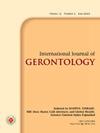Identification of Undetected Dementia and Hypoglycemic Risk Using the Dementia Assessment Sheet for Community-Based Integrated Care System 21-Items in the Glycohemoglobin-Guided Management of Elderly Individuals with Diabetes: An Exploratory Study
IF 0.3
4区 医学
Q4 GERIATRICS & GERONTOLOGY
引用次数: 1
Abstract
Background: Assessing cognitive function and the risk of hypoglycemia among older individuals with diabetes is an ongoing challenge. Although the Japan Diabetes Society/Japan Geriatrics Society Joint Committee has already provided recommendations for glycemic control in older individuals with diabetes, its usefulness in clinical settings remains unclear. Methods: A retrospective, single-center study was conducted on 616 outpatients aged over 65 years at Osaka Red Cross Hospital, Japan. They were assessed for glycemic control and cognitive function using the Dementia Assessment Sheet for Community-based Integrated Care System 21-items (DASC-21). Patients were categorized into three groups based on cognitive function, and each group was divided into six subcategories based on recommended therapeutic regimens. Results: Ninety-eight patients treated with insulin, sulfonylurea, or glinide were identified using DASC- 21 and classified into categories IIB and IIIB. The number of hypoglycemic events was divided according to the lower limit of the recommended glycohemoglobin (HbA1c) value. However, the results did not significantly differ. Notably, in 7 of 9 IIIB patients who with hypoglycemic events, their DASC-21 scores reached up to 36. This suggests that the physicians had not identified the risk of dementia before conducting the assessment using DASC-21, which might result in continuous therapy for diabetes including daily multiple insulin injections. Conclusions: Physicians can overlook the risk of hypoglycemia and cognitive impairment thereby failing to optimize diabetic therapies among older individuals if DASC-21 is not used during assessments in daily diabetic care.使用社区综合护理系统痴呆评估表识别未被发现的痴呆和低血糖风险-糖血红蛋白指导下老年糖尿病患者管理的21项:一项探索性研究
背景:评估老年糖尿病患者的认知功能和低血糖风险是一个持续的挑战。尽管日本糖尿病学会/日本老年医学会联合委员会已经为老年糖尿病患者的血糖控制提供了建议,但其在临床环境中的实用性仍不清楚。方法:对日本大阪红十字会医院616例65岁以上门诊患者进行回顾性、单中心研究。采用社区综合护理系统痴呆评估表21项(DASC-21)对患者进行血糖控制和认知功能评估。根据认知功能将患者分为三组,每组根据推荐的治疗方案分为六个亚类。结果:98例接受胰岛素、磺脲类或格列奈治疗的患者采用DASC- 21进行鉴定,并将其分为IIB和IIIB两类。根据推荐的糖化血红蛋白(HbA1c)值的下限来划分低血糖事件的次数。然而,结果并没有显著差异。值得注意的是,在9例发生低血糖事件的IIIB患者中,有7例的DASC-21评分高达36分。这表明医生在使用DASC-21进行评估之前没有确定痴呆的风险,这可能导致糖尿病的持续治疗,包括每天多次注射胰岛素。结论:如果在日常糖尿病护理评估中不使用DASC-21,医生可能会忽视低血糖和认知功能障碍的风险,从而无法优化老年人的糖尿病治疗。
本文章由计算机程序翻译,如有差异,请以英文原文为准。
求助全文
约1分钟内获得全文
求助全文
来源期刊
CiteScore
0.60
自引率
0.00%
发文量
0
审稿时长
6-12 weeks
期刊介绍:
The Journal aims to publish original research and review papers on all fields of geriatrics and gerontology, including those dealing with critical care and emergency medicine.
The IJGE aims to explore and clarify the medical science and philosophy in all fields of geriatrics and gerontology, including those in the emergency and critical care medicine. The IJGE is determined not only to be a professional journal in gerontology, but also a leading source of information for the developing field of geriatric emergency and critical care medicine. It is a pioneer in Asia.
Topics in the IJGE cover the advancement of diagnosis and management in urgent, serious and chronic intractable diseases in later life, preventive medicine, long-term care of disability, ethical issues in the diseased elderly and biochemistry, cell biology, endocrinology, molecular biology, pharmacology, physiology and protein chemistry involving diseases associated with age. We did not limit the territory to only critical or emergency condition inasmuch as chronic diseases are frequently brought about by inappropriate management of acute problems.

 求助内容:
求助内容: 应助结果提醒方式:
应助结果提醒方式:


